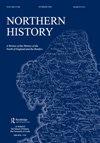乔纳森·奥茨:《反詹姆斯主义与英国人民,1714-1746》
IF 0.2
3区 历史学
Q2 HISTORY
引用次数: 0
摘要
可能使游客面临其他危险:饮酒、赌博和危险的性关系。水疗中心是讽刺的温床,许多同时代人都清楚地认为它可能会毁掉一个人,就像它可能是恢复和重塑的场所一样。尽管Murky Waters详细讨论了巴斯,但萨默塞特镇被认为是例外而非常规。Vasset区分了“国家水疗中心”和“当地水疗中心”,前者吸引了来自四面八方的游客,通常得到贵族或皇室的赞助,后者则因依赖当地名人而更加脆弱(巴斯自己的名人是花花公子Beau Nash)。这本书还质疑了温泉小镇和海滨小镇之间的所谓划分,指出斯卡伯勒这样的小镇可以被视为两者兼而有之。在约克郡、德比郡以及伦敦,水疗中心很常见,在18世纪末,许多人会发现自己离一个中等规模的水疗中心只有“合理的距离”(第9页)。(附录中包含了一张按地区和类别划分的18世纪温泉浴场的有用地图。)无论温泉浴场的地方特征如何,瓦塞特都认为温泉浴场可以被视为更广泛社会的缩影,“政治乌托邦和反乌托邦可以投射在其上的空白页”(第204页),例如社会的自我调节或新闻的控制。同时,他们可以成为接触外国品味和文化的点,因为顾客与其他国家的人混合在一起。Murky Waters并不声称是英国水疗中心的详尽历史。相反,它是对现有史学的一种制衡,后者倾向于将水疗中心呈现为一个愈合、恢复的地方,并有一个简单的年表。瓦塞特的结论包含了水疗中心的混乱,指出“水疗小镇在很多方面都是不按时间顺序排列的”,“时间不是线性的,而是周期性的、季节性的、短暂的”(第253页)。Murky Waters为水疗中心提供了一个令人信服和着迷的案例,它是一个矛盾、矛盾的空间,融合了怀旧和田园景观与颠覆潜力:一个八卦、性实验和建立新的激进政治联盟的场所。本文章由计算机程序翻译,如有差异,请以英文原文为准。
JONATHAN OATES, Anti-Jacobitism and the English People, 1714–1746
could expose visitors to other dangers: drinking, gambling, and risky sexual liaisons. Fertile ground for satire, the spa was clearly understood by many contemporaries as a place that could be the ruin of a person, just as it could be the setting for recovery and reinvention. Although Murky Waters discusses Bath at some length, the Somerset town is noted to be the exception rather than the rule. Vasset differentiates between ‘national spas’ that attracted visitors from far and wide, and which often had the benefit of noble or royal patronage, and ‘local spas’ such as Matlock in Derbyshire, the fortunes of which were more fragile due to their dependence on local celebrities (Bath’s own celebrity was dandy Beau Nash). The book also interrogates the supposed division between spa towns and seaside towns, noting that towns such as Scarborough could be considered to be both. In Yorkshire and Derbyshire, as well as in London, spas were common, and many people in the late eighteenth century would have found themselves within ‘reasonable distance of a middle-sized spa’ (p. 9). (An Appendix includes a useful map of eighteenth-century spas by area and category.) Whatever their local character, Vasset suggests that spas can be considered microcosms of wider society, ‘blank page[s] on which political utopias and dystopias could be projected’ (p. 204), such as the self-regulation of society or the control of news. At the same time, they could be points of contact with foreign tastes and cultures, as patrons mixed with people from other countries. Murky Waters does not claim to be an exhaustive history of the spa in Britain. Rather, it is a counterbalance to existing historiography that tends to present the spa as a healing, restorative, place with a straightforward chronology. Vasset’s Conclusion embraces the messiness of the spa, noting that ‘spa towns are, in many ways, un-chronological’, places where ‘time is not linear but cyclical, seasonal, ephemeral’ (p. 253). Murky Waters makes a convincing and fascinating case for the spa as an ambivalent, contradictory, space that melded nostalgia and bucolic landscapes with subversive potential: a venue for gossip, sexual experimentation, and forging new and radical political alliances.
求助全文
通过发布文献求助,成功后即可免费获取论文全文。
去求助
来源期刊

Northern History
Multiple-
CiteScore
0.20
自引率
33.30%
发文量
37
期刊介绍:
Northern History was the first regional historical journal. Produced since 1966 under the auspices of the School of History, University of Leeds, its purpose is to publish scholarly work on the history of the seven historic Northern counties of England: Cheshire, Cumberland, Durham, Lancashire, Northumberland, Westmorland and Yorkshire. Since it was launched it has always been a refereed journal, attracting articles on Northern subjects from historians in many parts of the world.
 求助内容:
求助内容: 应助结果提醒方式:
应助结果提醒方式:


